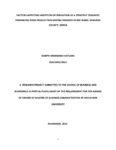| dc.description.abstract | The ASAL areas today face the challenge of feeding its population, and thus face malnutrition and hardly go without food aid during drought seasons. The adoption of irrigation holds the key to food security. This research was intended to investigate the factors affecting the adoption of irrigation as a strategy to enhancing food production among farmers in Kee Ward, Makueni County. The research’s variables included the level of income, the level of education of the household head, and the availability of training and extension services to the farmers. The study had three specific objectives of the study are to assess the extent to which the level of farmers’ income affect the adoption of irrigation, to analyze how the level of education of the farming head affect the adoption of irrigation, and finally to determine the effect of training and extension services on farmers in the adoption of irrigation as a strategy towards enhancing food production. The research design adopted was descriptive in nature, and the sampling technique was a twostage sampling technique, which involved purposive sampling for the 28 farmers who have adopted irrigation and simple random sampling of another 28 farmers who have not adopted irrigation. A sample of 56 respondents was therefore selected from the target population of Kee Ward’s 4,298 farmers. The target population consisted of all the farmers within Kee ward, which included both commercial and subsistence farmers. A self-reporting questionnaire was used to collect data. This included both structured and unstructured questions in order to capture the data appropriately. Data was then analyzed both quantitatively and qualitatively through descriptive and inferential statistical analysis techniques including a multiple regression model according to the objectives of the study. The study found out that those who had adopted irrigation had a higher income compared to those who had not adopted, that most of those who had adopted irrigation had done tertiary education unlike those who had not adopted who majority had done up to form 4, and that agricultural training seminars were hardly organized in Kee ward, and that Kee ward had very few agricultural extension officers. The study recommended that the county and national governments should subsidize irrigation inputs, advance cheap credit facilities to farmers in ASALs, and subsidize education at all levels (including tertiary levels). The study also recommends the county government to employ adequate agricultural extension officers in ASALs, also have demonstration plots in every ward, and also arrange for free farm clinics in ASALs for the farmers to learn. | en_US |

